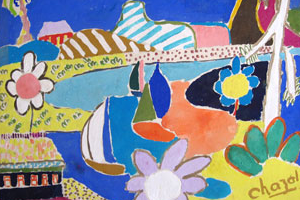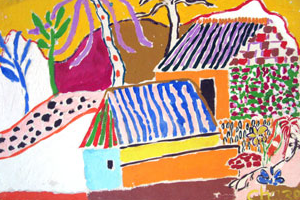Guide to Mauritian artists: Malcolm de Chazal

Like so many artists and philosophers of the twentieth century, Mauritian visionary Malcolm de Chazal forged a path for himself that was far removed from the expectations of his family and contemporaries, allowing him to remain both relevant and influential some 32 years after his death.
Born in Vacoas in 1902, into a distinguished French family well-established in the sugar industry of Mauritius, Chazal was the youngest of 13 siblings. He grew up in a deeply religious household which had abandoned the Catholic church en masse to follow the teachings of Swedish theologian Emanuel Swedenborg. But he was soon to develop his own spiritual concepts and ideas, and mature into an original thinker who himself became much revered by other intellectuals.
After a successful education at Curepipe’s Royal College, it was considered a given that Chazal would follow suit into the sugar industry, and he gained his qualification as a sugar engineer at Baton Rouge university in Louisiana. But when he returned to Mauritius from the USA at the age of 32 – by which point he had travelled extensively in countries as varied as Indonesia, Canada, Cuba and France – he was deeply critical of the methods and practices of the industry in Mauritius.
Much to the chagrin of his family he eventually abandoned all things sugar for a minor role at various factories and the government telecomms department, so he could focus his mind more fully on the literary arts.
Chazal was an enigmatic artist and poet of profound sensitivity who harboured a deep and abiding love of his homeland. This affection shines brightly throughout all his work, but especially in his remarkable written aphorisms which express the essence of Mauritius and its flora and fauna in ways that were entirely groundbreaking at the time and still resonate decades later. Through the lens of his subconscious mind, he’d discern something as simple as a native plant or butterfly with a slant so original and abstract it provoked other writers to call him a genius.
“The flower has no weekday self, dressed as it always is in Sunday clothes.”
“The sun is pure communism everywhere but in cities, where it's private property.”
“Monkeys are superior to men in this: when a monkey looks into a mirror, he sees a monkey.”
“The family is a court of justice which never shuts down for night or day.”
“A moody silence between lovers is a shared widowhood.”
By the time Sens-Plastique – his seminal collection of insights, aphorisms, metaphors and ideas – was published in 1945, he had already written dozens of books which began to lay out his Chazalian vision in the form of “Pensées” (literally: thoughts). But it wasn’t until Volume II arrived in 1948 that he grew prominent in France and began to be hailed as a surrealist by André Breton – although in his lifetime Chazal never claimed any artistic or philosophical influence at all.


